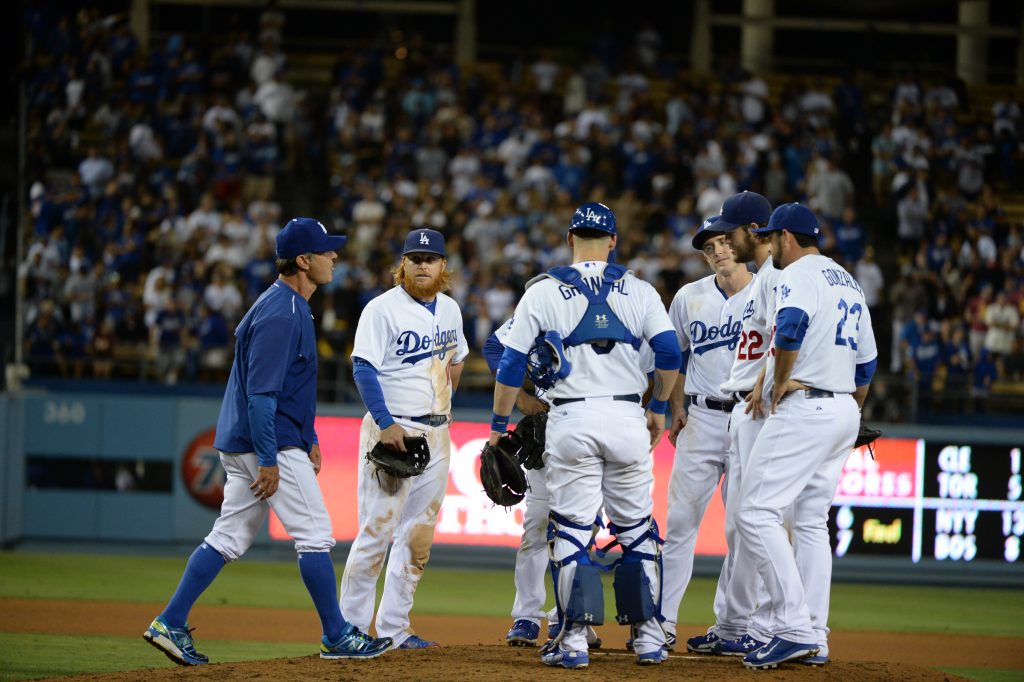
Don Mattingly visits Clayton Kershaw at the mound before leaving him in to finish the Dodgers’ September 2 victory over the Giants. (Jill Weisleder/Los Angeles Dodgers)
By Jon Weisman
The other day on Twitter, I proposed a hypothetical that I think you could call a nice problem to have.
Instant "It's Your Call": NLDS Game 1. Dodgers score 7 in first. (Yay!) Kershaw pitching shutout. How long do you let him pitch? #DIYourcall
— Dodger Insider (@DodgerInsider) October 1, 2015
How long would you let Clayton Kershaw pitch in Game 1 of the playoffs with a 7-0 lead? Here’s the rock-solid consensus that emerged:
- one? Bring him back in game 3.
- until he gives up 3-4 runs. As is the case with any other Kershaw start
- Maximum 5
- 5 innings
- 5 innings if score remains the same
- 5 innings 70-75 pitches maybe
- At least 5 IP and no more than 7 IP or 80 pitches (LLWS rules–he can complete whatever at-bat he starts).
- Maybe 90 pitches? Keep him loose and rested for a possible second start? I’m not confident in my answers hence the ?s lol
- No reason for super early hook. Not like you’re gonna throw him in Game 3. 5-6 innings.
- maybe 6 innings…especially if he’s looking like he’s running out of gas.
- 6 IP, or ~90 pitches
- 6 innings.have him rested for gm 4 or 5 bullpen has been a lot better down the stretch, let’s wet their beak
- 6 innings or 95-100 pitches. Whatever comes first.
- If still scoreless after 6, the bullpen would take over.
- Once a run is given up after the sixth inning
- 7
- 7 innings.
- 7 innings. Pitchers are creatures of habit. Going less might throw his rhythm off.
- 7 innings max
- depending on pitch count, but I would keep him in through 7, as long as we have a 7 run lead.
- 100 pitches. I’d want to avoid overworking him or the bullpen, and pulling him too early could hurt his routine.
- truly depends on his pitch count, I want Kersh to pitch game 4 on short rest so I don’t let him go over 105 pitches
- 8. Give it to Kenley.
- as long as he’s effective, no doubt
- THE WHOLE GAME
- Ask Mattingly what he thinks, and have the bullpen ready the inning before.
That last one was worth a chuckle, though clearly there’s an element of seriousness to it. Biting wit, I believe it’s called. Either way, it sort of hones in on the hurricane of conversation that forever encircles Don Mattingly, even though high-stakes decisions in baseball are rarely easy. There are far fewer obvious moves than most people believe.
I could have asked what a manager should do, say, in the seventh inning with Kershaw with two runners on and a 2-0 lead — Should he make a pitching change? If so, who should come in? Should there be a double switch? — and undoubtedly there would be a range of replies. It’s like this with everything. Not long ago this season, I found myself smack in the middle of a discussion of those who think Mattingly bunts too much and those who don’t think he bunts enough.
Think about it this way. In 2015, opposing batters reached base against National League Cy Young Award candidates Zack Greinke, Jake Arrieta and Kershaw between 23 and 24 percent of the time. That obviously fluctuates depending on the batter, but essentially, a Major League position player probably has no worse than a 1-in-5 or 1-in-6 chance of succeeding against the best pitchers in baseball. If it’s a opponent’s best hitter, maybe that guy has a 1-in-4 chance.
The odds aren’t going to be much better against Dodger relievers. Even the big man, Kenley Jansen, allowed a .215 on-base percentage this year.
A manager can make the best possible decision, and still have it backfire 20 percent of the time. And a manager can make a worse decision, and still have it succeed 70 to 80 percent of the time.
This plays into what Farhan Zaidi was saying Tuesday about managers, and how few of their key decisions are black-and-white. You might make a move because it has a 5 percent chance of improving your odds. But you’ll be judged as if that were 0 or 100 percent.
Don’t get me wrong: That’s what Mattingly and every other Major League manager has signed up for. No one dragged them into this blindly. When you get to October, results are all anyone cares about. So sometimes, even in this context, these managers make the wrong play.
But it will rarely be night-and-day wrong. It will be a choice between rolling one set of dice and rolling another set of dice.
If this comes across is me making excuses for the current Dodger manager, just know that this would apply for pretty much any manager around.




jpavko
KERSH pitches until his arm falls off. He’s the best the Dodgers have. Why would you want anyone else on the mound? The phrase”you’ll take the baseball away from me when you pry it from my cold dead hands” sounds like CK
lovewhiskey
Life is so rarely black and white and even the best intentions (or decisions made to put forth the best chances of winning in the manager’s mind) can go awry. It’s nice to be reminded of that sometimes as fans (may) have a (slight) tendency to pin all responsibility for success on the coaching staff.